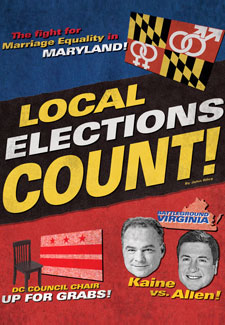
The United States might be in the grips of election fever, as Barack Obama and Mitt Romney duke it out in cash-covered campaigns. In the DMV – D.C., Maryland and Virginia – that fever exists, but to varying degrees and for various reasons.
There's no doubt that Obama will win the District and Maryland. Virginia, however, is a wild card. And although Maryland is solidly blue, the question of the season is whether the state's voters will break with history and allow Maryland's marriage-equality law to take effect. In the District, the chair of the D.C. Council is in play, along with plenty of other seats.
The presidential race might be the scene-stealer, but there is plenty to watch at the local level as the DMV heads into Election Day.
NO SPOTLIGHT, BUT A FULL BALLOT IN D.C.
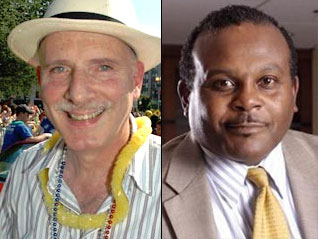
Phil Mendelson and Calvin Gurley
It's hard being an unappreciated District voter.
While attention is being lavished on all-important swing voters in Virginia's competitive presidential and U.S. Senate races, and with Maryland in the spotlight to possibly become the first state to have voters back marriage equality, the District is all but ignored.
Yet D.C. voters will be tasked with filling half of the seats on the 13-member D.C. Council, various School Board positions and more than 200 spots on Advisory Neighborhood Commissions.
Chief among these local races is a special election to determine the D.C. Council chair for the next two years. Facing off in that race is current Chairman Phil Mendelson (D-At Large) – selected by his Council colleagues to lead the legislative body after former Chairman Kwame Brown resigned amid scandal in June – and Calvin Gurley, a Democrat from Ward 4. John Cheeks, a former independent candidate for the Ward 5 Council seat, announced his candidacy but was later declared ineligible. Cheeks has nevertheless marshaled volunteers to attempt a write-in campaign.
Whatever attention the Council chair race may be getting, it won't be front and center on the ballot.
''The race appears on the back of the ballot, with the referendums,'' Gurley told Metro Weekly, referring to three proposed charter amendments that would, respectively, allow the Council to expel a member for ''gross misconduct,'' and prohibit anyone convicted of a felony while in office from staying in office, or running for Council or mayor in the future. ''I wonder how that happened.''
Mendelson agreed that the special election for the chairman's seat, normally on the ballot in non-presidential-election years, has largely gone under the radar.
''My only concern is that people may not think my race is close, and may not realize it's important to vote,'' he said.
In addition to attending various political forums around the District, Mendelson has used his advocacy on behalf of the LGBT community to round up support from some of D.C.'s most politically engaged voters. He recently received the endorsement of the Gertrude Stein Democratic Club, the city's largest LGBT political organization, and was given a 10-point rating – the highest possible – by the Gay and Lesbian Activists Alliance (GLAA).
''I think, on LGBT issues, I've been a consistent supporter of the community,'' Mendelson told Metro Weekly. He pointed to his advocacy of marriage equality, including testifying multiple times in favor and moving the District's marriage-equality bill through the Judiciary Committee and to the full Council, where it passed on an 11-2 vote. He also touted his success in passing other measures that were designed to amend laws to establish parity between rights and responsibilities granted to same-sex couples and those granted to heterosexual couples.
While Gurley has criticized Mendelson and the other incumbent councilmembers for ''lacking leadership,'' alleged ethical lapses and what he sees as failure to act on education, crime and jobs, Mendelson knocked Gurley for publicly criticizing him at a meeting of Ward 8 Democrats for his opposition to a referendum that could potentially repeal marriage equality in D.C.
Gurley, who ran for the Ward 4 Council seat against Councilmember Muriel Bowser (D) earlier this year, told the GLAA that although he would not vote to repeal the District's marriage-equality law, he did feel that voters should have had a chance to express themselves through the referendum process.
Regarding other issues particularly important to LGBT residents, Gurley told Metro Weekly that he would support more training for police officers related to LGBT cultural sensitivity and the reporting of potential hate crimes, and would recommend that Metropolitan Police Department Chief Cathy Lanier reassign more than 300 officers he says are on ''desk duty'' to the streets to combat crime. He also said he would support measures to help address bullying in schools.
Cheeks, in his campaign for the Ward 5 seat earlier this year, told Metro Weekly that as a Roman Catholic he supports the beliefs of his church and would have voted against the marriage-equality law. Cheeks expressed reservations about requiring police officers to take cultural-sensitivity training, citing costs.
Lateefah Williams, president of the Stein Club, said there is a perception that the race for D.C. Council chair is not highly contested, but that Stein members are fully committed.
''Our members know about the special election, and our community is very supportive of Phil Mendelson,'' Williams said.
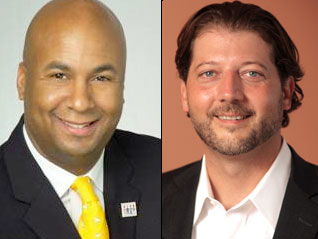
Michael A Brown and David Grosso
For other local races that will appear on the Nov. 6 ballot, Williams said most are not competitive, although the race for the non-Democratic, at-large Council seat will likely be a contest.
The at-large race features incumbent Councilmembers Vincent Orange (D-At Large) and Michael A. Brown (I-At Large); independent candidates David Grosso, A.J. Cooper and Leon Swain Jr.; DC Statehood Green Party nominee Ann Wilcox; and Republican nominee Mary Brooks Beatty. Orange, as the only Democrat in an overwhelmingly Democratic city, is widely expected to be re-elected by a large margin, but the remaining non-Democrat seat may feature a tighter race.
According to a poll commissioned by WAMU's The Kojo Nnamdi Show and The Washington City Paper, when Orange was omitted from the choices provided to likely voters, Brown held only a 5-point edge over Grosso – once a staffer for Congresswoman Eleanor Holmes Norton (D-D.C.) and former Councilmember Sharon Ambrose (D-Ward 6) – with Brown leading 26 percent to 21 percent. Beatty earned 9 percent, Cooper earned 7 percent, Wilcox earned 5 percent and Swain earned about 1 percent of the vote, while 32 percent of voters were undecided.
The remaining four Council seats up for re-election are those of Councilmembers Jack Evans (D-Ward 2), Muriel Bowser (D-Ward 4), Yvette Alexander (D-Ward 7) and Marion Barry (D-Ward 8). Evans and Bowser are unopposed, while Alexander faces off against Republican Ron Moten, and Barry faces a challenge from independent Jauhar Abraham.
District voters will also decide whether to re-elect Norton to Congress or opt for one of her challengers, Libertarian Bruce Majors, who is gay, or Natale Lino Stracuzzi, of the Statehood Green Party. Seats for U.S. shadow senator, U.S. shadow representative, various Board of Education races and local ANC commissioner seats – which feature a number of gay first-time candidates seeking office – are also in play. In the Board of Education races, longtime gay activist Philip Pannell is running for the Ward 8 seat, while gay ANC Commissioner Jack Jacobson (2B04) is running for the Ward 2 seat. While Jacobson is running unopposed, Pannell is racing against Trayon White. Stein Democrats have endorsed both Jacobson and Pannell. Stein Democrats also endorsed Democrat Nate Bennett-Fleming, longtime ally to the LGBT community, running for shadow representative against Statehood Green's G. Lee Aikin.
The LGBT Log Cabin Republicans endorsed the three Republicans appearing on the general election ballot: Moten, Beatty and U.S. shadow senator candidate Nelson Rimensnyder. All three have pledged that they would not support efforts to change, repeal or overturn the District's marriage-equality law.
Meanwhile, the Stein Democrats, in addition to endorsing Mendelson, endorsed Evans, Bowser and Orange for re-election to the Council, as well as U.S. Shadow Senator Michael D. Brown. The group withheld endorsements in the Ward 7 and Ward 8 D.C. Council races. A Stein Club meeting to consider an endorsement for the non-Democratic at-large D.C. Council seat was scheduled for Tuesday evening, Oct. 23, after Metro Weekly deadline. (A recap of that meeting is available online at MetroWeekly.com.)
MARYLAND MARRIAGE DOWN TO THE WIRE

With less than two weeks to Election Day, Maryland is awash in political ads, mostly focusing on several referendums asking voters to decide the fate of laws passed by the Maryland General Assembly earlier this year.
One referendum, Question 6, concerns the status of the recently passed Civil Marriage Protection Act, which allows same-sex couples to obtain state marriage licenses. The act was signed into law by Gov. Martin O'Malley, a Democrat, in March, but was designed to not take effect until Jan. 1, 2013, to provide for the possibility of such a referendum effort.
Maryland is one of four states – Maine, Minnesota and Washington being the other three – where voters will decide Nov. 6 to expand or restrict marriage equality.
Maryland's challenge in approving Question 6 and upholding the marriage-equality law is twofold: getting supporters, particularly liberal and moderate voters, to the polls, and winning more African-Americans to the ''Yes on 6'' side.
Unlike Washington state, which features a number of races at the presidential, congressional and gubernatorial levels, as well as a ballot measure legalizing and regulating small amounts of marijuana, which are expected to drive liberal, Democratic and youth turnout, Maryland is considered relatively uncompetitive except for seven different statewide referendums, meaning the likely electorate may skew older and more socially conservative.
While polling earlier in the year had shown strong opposition among African-American Marylanders regarding marriage equality, that opposition has lessened substantially in subsequent polls, particularly since President Obama and the national board of the National Association for the Advancement of Colored People (NAACP) endorsed marriage equality earlier this year. African-Americans are expected to constitute about a quarter of Maryland's electorate. Should Question 6 pass, Maryland will not only be the first state to legalize same-sex marriage at the ballot box, but it would also likely erode a strategy of framing marriage equality as an issue to divide the black community and the gay community, as anti-marriage groups have attempted.
Since July, polling has generally shown supporters of marriage equality with substantial leads, particularly among registered voters, where support for marriage equality has polled above 50 percent and its margin of victory has ranged from 8 to 14 points.
Among likely voters, an OpinionWorks poll for The Baltimore Sun in September found that 49 percent of likely voters in Maryland said they would vote to make same-sex marriage legal, while 39 percent would vote to make it illegal. The poll's margin of error is 3.5 percent. A Washington Post poll of likely voters in October showed that, after being asked questions that read similar to the language on the ballot, 52 percent of likely voters would vote in favor of Question 6, while 43 percent would vote against it. The margin of error for that poll is 4 points.
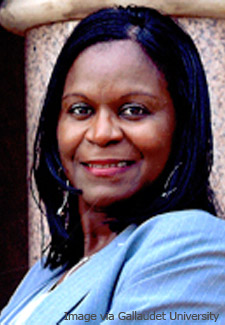
Angela McCaskill
(Photo via Gallaudet.edu)
With the polls expected to tighten heading to Election Day, supporters and opponents of Question 6 are flooding airwaves with advertisements of carefully crafted, poll-tested messaging aimed at swaying undecided voters or ''soft'' supporters. As such, any event related to marriage can be a flashpoint opportunity.
In one such incident, Angela McCaskill, a Maryland resident and the chief diversity officer at D.C.'s Gallaudet University, was placed on paid administrative leave after it was revealed that she had signed a petition to place the Civil Marriage Protection Act on the ballot. Opponents of marriage equality, including the Maryland Marriage Alliance and the Family Research Council, seized upon McCaskill's suspension as evidence that proponents of Question 6 were engaging in intimidation, and implied that the marriage-equality law would lead to more suppression of marriage opponents' basic rights. The Maryland Marriage Alliance went so far as to feature video clips of McCaskill in an ad against Question 6. McCaskill, regarded on campus as a strong supporter of the LGBT community, said she signed the petition to allow Maryland voters final say on the law, and has since asked that the anti-Question 6 ad featuring her not be aired.
Yet supporters of marriage equality were equally ardent in calling for McCaskill's reinstatement, with Marylanders for Marriage Equality taking out a full-page ad in Annapolis's The Capital newspaper asserting that McCaskill was fully within her rights to sign the petition. Josh Levin, campaign manager for Marylanders for Marriage Equality, a coalition of labor, religious and community groups seeking to approve Question 6, reiterated to Metro Weekly that McCaskill had a right to sign the petition and should be back on the job at Gallaudet.
The coalition, however, has plenty to do aside from asking that McCaskill be reinstated. Levin said the coalition has made hundreds of thousands of voter contacts through phone-banking and canvassing to convince people to vote for Question 6. He said Marylanders for Marriage Equality has worked hard to put together television ads that make the case in powerful ways.
One of the ''Yes on 6'' coalition's chief arguments has been that the law, in allowing same-sex couples to obtain state marriage licenses, continues to protect clergy and religious organizations from having to perform or recognize marriages that violate their religious beliefs. The ballot language specifically references those protections, providing what Levin calls a ''full and fair description of what the law does.''
Levin also knocked marriage-equality opponents for airing ''misleading'' ads, such as the one featuring McCaskill, that he said distort the issue.
''What Question 6 does is say that all people need to be treated equally under the law,'' Levin said. He also contrasted the nature of the pro-equality campaign with that of its opponents, pointing out that the National Organization for Marriage (NOM), the chief financial backer of the Maryland Marriage Alliance, doesn't disclose its donors and stated in an internal memo that one of its goals was to ''drive a wedge'' between the LGBT and African-American communities. By comparison, he says, Marylanders for Marriage Equality has received much more grassroots support, rather than relying on large sums of money from out-of-state organizations like NOM and the Knights of Columbus.
''We have over 950 pages of donors, most of them small donors,'' Levin told Metro Weekly. ''We've raised more from Maryland residents than our opponents have raised in total.''
To reach out to various communities within the state, Marylanders for Marriage Equality has adopted various strategies ranging from partnering with community organizations; to airing radio and television ads aimed at African-Americans, Catholics and voters on Maryland's Eastern Shore; to highlighting support for Question 6 among various interfaith leaders, Levin said.
''There's been a steady increase in support for marriage equality in Maryland over the course of the year,'' Levin said. ''Naturally, the polls are going to tighten. We were never going to win by 9 or 14 points, or whatever the polls are showing. It's going to be a very close election, but we're confident we'll be able to uphold the new law.''
But opponents are also busy trying to defeat the measure, sometimes resorting to racial appeals. One independent group called Jump the Broom for Marriages has been plastering fliers around African-American/racially mixed sections of Baltimore City that seem designed to exploit stereotypes that being gay is a white phenomenon, one that threatens the stability of black families.
Some fliers distributed by Jump the Broom in Baltimore's eastern neighborhoods feature a picture of a heterosexual black couple getting married, with the words: ''If my mommy is my daddy, and my daddy is my mommy, what does that make my aunt?'' Another version reads: ''The Church Community Stands Against Same-Sex Marriages.'' Both fliers include biblical citations. A more recent flier, also distributed by Jump the Broom, features two scantily dressed same-sex couples – one male and one female – kissing and holding hands at what looks to be a gay pride parade. The flier reads: ''Do not allow gay and lesbian couples to obtain a marriage license! STOP Gay Marriages in Maryland. Vote NO to Question 6.''
The Maryland Marriage Alliance, as the chief group leading the repeal effort, has also been reaching out to voters, trying to argue that marriage equality will harm children and may lead to attacks on religious freedom and against those who oppose marriage equality.
Requests for an interview with Derek McCoy, president of the Maryland Marriage Alliance, were not granted by Metro Weekly deadline.
Although he declined to comment on the specifics of his coalition's ''get out the vote'' efforts, Levin said the number of volunteers has been growing.
''We need as many people as possible to volunteer,'' he added, pointing to several activities that the campaign has scheduled ahead of Election Day.
Several volunteers fighting for Question 6 also stressed the importance of getting involved and donating time to ensure that marriage equality becomes the law in Maryland.
Jason Gedeik, 37, of Silver Spring, said he became a volunteer after his husband, Evan Glass, an Equality Maryland board member, hosted a house party where state delegates spoke about volunteering. Gedeik said he was hesitant to volunteer as a phone-banker at first, largely because he was unsure of how he felt about phoning strangers and engaging them around a politically and socially sensitive issue. But he also felt it was important to do something to ensure equal rights for himself and his husband.
''I've had some really rewarding conversations with people where I was able to help them see the importance of granting the same legal rights to gay couples that straight couples currently have,'' Gedeik said of his experience.
Gedeik said he primarily focused on calling voters in Prince George's County, a vote-rich area in the D.C. suburbs considered one of the state's political ''battleground'' areas. He often received mixed responses from people he called, with some saying they felt uncomfortable sharing their opinions with a stranger, and others indicating uncertainty or conflicting feelings.
''That's when you realize you have a window to crawl through to them and you begin to engage in a conversation,'' Gedeik said. ''I would read the entire wording of the ballot question. When they stopped to listen to the wording and about how the measure protects religious liberty and doesn't force churches to perform same-sex marriages, they really calmed down and felt more comfortable with the issue. Many said they would support the measure.''
One woman that Gedeik spoke with asked him to tell her how to vote. Gedeik said he couldn't tell her that, but shared his personal story of his marriage to his husband, talking about real-world scenarios that affect gay couples when they are denied equal protection under the law. After hearing his story, the woman told him he had convinced her to vote for Question 6.
''When people understand that a vote against this measure will cause other citizens to suffer, a light bulb goes off in their head and their hearts begin to open,'' Gedeik said.
Khadijah Brown, 27, of Fort Washington, Md., said she became a volunteer phone-banker and canvasser after signing up on the Marylanders for Marriage Equality website. Brown said she has also focused her efforts primarily on Prince George's County, canvassing in the Laurel area. But Brown said she is particularly fond of calling voters.
''I really enjoy phone-banking,'' she said. ''I enjoy reaching out to people and having a conversation, especially with people who have some apprehension about the law.''
''For the most part, you get people who can hear you out, even if you agree to disagree,'' Brown said of the feedback she's received on those cold calls. But she notes that even in Prince George's County, once considered by pundits an area hostile to marriage equality, she's received positive feedback with about half of all contacts telling her they will vote for Question 6.
''Honestly, the toughest part is getting people on the phone,'' Brown said.
Brown, in a registered New Jersey civil union with her partner, with whom she is raising four children, said her efforts on behalf of the campaign can have her arriving home late, but said she feels like she is fighting for her family.
''I feel like I'm giving back,'' she said. ''It's a phenomenal feeling.''
She also said that other people from Maryland and the D.C. area should get off the sidelines and help the campaign with the final push into Election Day.
''Anyone who believes in fairness or equality should step out and do some volunteer work, even if it's only for the last week of the campaign,'' Brown said. ''We've got to stand up for what we believe. If you're not using your voice and fighting for what you want, you have no excuse to complain when it doesn't work out in your favor.''
IN THE SWING IN VIRGINIA
While the tourism tagline might tout Virginia as the place for lovers, right now it's all about the voters.
Buoyed by Virginia's crucial role in the presidential race, as well as its potential to decide – as it did six years ago – which party controls the U.S. Senate, LGBT volunteers from D.C. have been heading across the Potomac to join their commonwealth counterparts knocking on doors, calling registered voters and otherwise convincing people to support pro-equality candidates on Election Day.
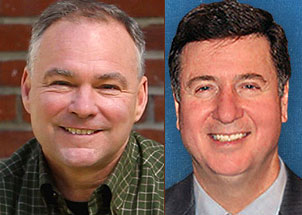
Tim Kaine and George Allen
After the presidential race, the next-biggest attraction is the U.S. Senate race pitting George Allen (R) – the former governor and senator, who held the Senate seat from 2000 to 2006 before losing to incumbent Sen. Jim Webb (D) – against former Gov. Tim Kaine (D). A Kaine victory would likely help Democrats retain their Senate majority.
LGBT activists are also trying to defend three incumbent House Democrats – Bobby Scott of Newport News, Gerald Connolly of Mantua and Jim Moran of Arlington – all of whom support marriage equality and received high ratings on the annual congressional scorecard released by the Human Rights Campaign, the nation's largest LGBT civil rights organization. Scott received a 95 percent rating for the current session, while Connolly and Moran received 100 percent ratings.
In coordination with the presidential and Senate campaigns, the LGBT Democratic Caucus of Virginia – formerly the Virginia Partisans – has been sending volunteers to assist the campaigns with voter identification and outreach.
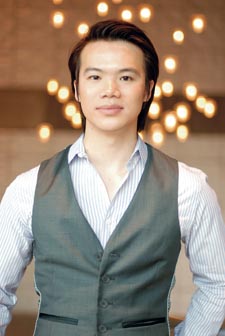 Linh Hoang
Linh Hoang
Linh Hoang, a board member of the LGBT Caucus and a member of the Fairfax County LGBT Committee, is one such volunteer, having phone-banked and canvassed on behalf of the Obama and Kaine campaigns, as well as phone-banked for U.S. Rep. Tammy Baldwin (D-Wis.), who is seeking to become the first out lesbian elected to the U.S. Senate and whose race is also crucial to keeping the Senate Democratic.
Hoang said most voters do not specifically ask about LGBT issues when contacted, as the idea is to integrate the LGBT volunteers with the rest of the campaign. He said several other volunteers are associated with other local and national LGBT groups, though not on a formal basis.
Hoang has also been working to reach out to Northern Virginia's large Vietnamese-American community on behalf of the campaigns, registering, persuading and educating potential voters about the candidates, issues and Virginia's voter ID law.
Asked about Kaine's commitment to the LGBT community, Hoang defended the Senate hopeful, who has stopped short of endorsing marriage equality. Hoang says Kaine is LGBT-friendly and would treat LGBT people with respect while working to advance equal rights.
''George Allen would take away LGBT rights,'' Hoang added of Kaine's Senate-race rival. ''Kaine will differ in his opinion sometimes, but he's sympathetic and open-minded. That's the type of person you want in the Senate.''
Virginia state Sen. Adam Ebbin (D-Arlington, Alexandria), the General Assembly's only out gay legislator and who has participated on phone-banks and rallied volunteers on behalf of his party's nominees, is also a stalwart defender of Kaine's record.
''Tim Kaine is uniquely qualified to reach across the aisle,'' Ebbin said. ''It was Kaine, after all, who worked with President Bush to save the aircraft carrier in Hampton Roads. George Allen is a partisan bomb-thrower, rather than a force to bring people together.''
Furthermore, Ebbin said, Kaine has a record on LGBT rights that Allen cannot match. On his first day in office as governor, Kaine issued an executive order against discrimination in hiring that explicitly mentioned sexual orientation. When Virginia faced the Marshall-Newman Amendment, which enshrined a ban on recognition of same-sex relationships into the Virginia Constitution, it was Kaine who spoke out against it, said Ebbin.
He also pointed to Kaine's background as a civil rights lawyer and his willingness to show support for the LGBT community. And, Ebbin added, Kaine supports relationship equality – if not marriage equality – where LGBT relationships are afforded the same benefits, rights and responsibilities enjoyed by couples in heterosexual relationships.
Ebbin encouraged D.C.'s equality-minded activists to cross the river and help in Virginia during these final days of the campaign.
''I'm excited we've got a committed team of people who realize how high the stakes are,'' he said. ''We can't coast on the success of four years ago. This campaign is not going to be won with TV commercials, but by registration, identification of voters, and call by call.''
One of the District-based organizations following Ebbin's advice is the Gertrude Stein Democrats. Club President Lateefah Williams said that although members have volunteered in Maryland for Question 6, the bulk of the club's volunteerism has taken place in Virginia, working on behalf of Obama, Kaine and other Democrats.
For instance, Williams said, Stein members have phone-banked in conjunction with the LGBT Democrats of Arlington to reach likely Democratic voters and get them to turn out Nov. 6. Some Stein members have also volunteered as canvassers.
The Stein Club's GOP counterpart, the Washington, D.C., Log Cabin Republicans, has, in the words of President Robert Turner II, ''deployed'' members to Virginia on behalf of the Romney and Allen campaigns, as well as to Massachusetts, New York and Ohio districts with Republican incumbents who are considered LGBT-friendly.
The Northern Virginia chapter of the Log Cabin Republicans is currently inactive, but the group's former vice president and political director, David Lampo, said that while the chapter won't be endorsing any candidates, it would have endorsed Patrick Murray, the Republican nominee in Virginia's 8th Congressional District, against Moran.
According to Lampo, Murray has ''evolved tremendously'' on LGBT issues since his 2010 run against Moran, opposing the Defense of Marriage Act, supported the repeal of ''Don't Ask, Don't Tell,'' and supports relationship recognition for same-sex couples.
Virginia's main nonpartisan LGBT-rights organization, Equality Virginia, will also be providing information to voters interested in congressional candidates' stances on various LGBT issues via the website of Equality Virginia Advocates, the lobbying and political branch of the organization, as well as by email to Equality Virginia members.
''Equality Virginia distributes questionnaires to congressional candidates every cycle,'' Equality Virginia Executive Director James Parrish said in a statement. ''We ask about the candidate's support on pro-equality legislation, including the Employment Non-Discrimination Act, the Respect for Marriage Act, the Every Child Deserves a Family Act, the Student Non-Discrimination Act and appropriations for HIV/AIDS programs.''
Those positions will be accessible online starting Nov. 1 at evadvocates.org.
...more